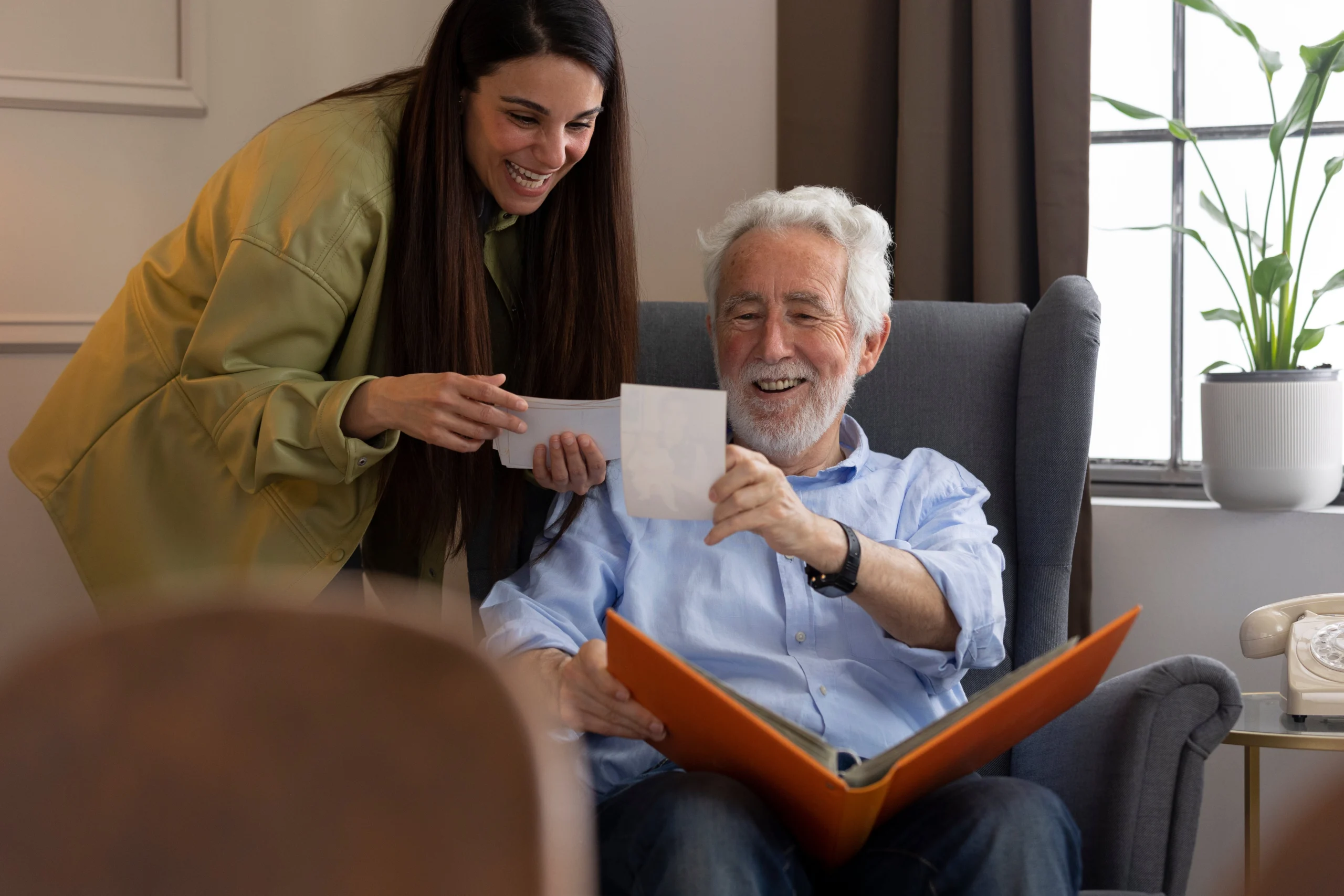The morning routine that once flowed seamlessly becomes fragmented. Conversations circle back to the same topics. Simple tasks that were second nature now require extra thought and patience.
Yet within these challenges lies opportunity.
The right memory care activities can do more than fill empty hours, they can strengthen remaining cognitive abilities, spark moments of joy, and maintain the dignity and identity that make your loved one uniquely themselves.
Understanding how to choose and implement these activities becomes crucial whether you’re exploring in-home memory care options or supporting a family member independently.
The difference between activities that frustrate and those that flourish often comes down to thoughtful selection and genuine understanding of what makes each person tick.
What Makes Memory Care Activities Truly Effective?
The most powerful memory care activities share three essential characteristics: they connect with personal history, they’re appropriately challenging, and they create opportunities for success rather than failure.
Personal Connection Creates Engagement:
A retired mechanic might light up when sorting nuts and bolts by size, while a former teacher could find deep satisfaction in organizing books or helping with simple reading activities. These aren’t random preferences, they’re neural pathways carved deep by decades of meaningful work and passion.
The Sweet Spot of Challenge:
Effective memory care activities live in what researchers call the “zone of proximal development,” challenging enough to stimulate cognitive function without overwhelming existing abilities.
This zone shifts over time, requiring ongoing adjustment and keen observation from caregivers and family members.
Success Builds Confidence:
Every completed puzzle piece, every successfully recalled song lyric, and every moment of recognition create positive reinforcement. These small victories accumulate into improved mood, better cooperation with care routines, and sustained engagement in beneficial activities.
Read more: How Elderly Companion Care Supports Mental Health and Longevity
How Do Different Types of Memory Care Activities Support Cognitive Function?

Research shows that different types of activities stimulate various regions of the brain, creating what neuroscientists call “cognitive reserve,” the brain’s ability to maintain function despite age-related changes.
By understanding how specific memory care activities target different cognitive domains, families can create well-rounded programs that address multiple aspects of brain health simultaneously.
The three main categories of therapeutic activities, creative expression, physical movement, and cognitive stimulation, each offer unique benefits while often overlapping in their positive effects.
The magic happens when these activities are combined thoughtfully throughout the day and week.
Creative Expression: More Than Art Therapy
Creative memory care activities tap into parts of the brain that often remain intact longer than other cognitive functions.
When someone with short-term memory loss in elderly stages sits down with watercolors, they’re not just painting, they’re accessing emotional memories, practicing fine motor control, and expressing aspects of their personality that words might not capture.
Music holds particular power in memory care.
Familiar songs from youth often remain accessible even when recent memories fade. Singing along to favorite tunes exercises language centers, provides rhythmic structure, and can trigger cascades of positive memories.
Simple instruments like tambourines or maracas add physical engagement without requiring complex coordination.
Visual arts, from simple collages to finger painting, offer tactile stimulation while encouraging self-expression. The key lies in focusing on the creative process rather than the final product, allowing for exploration without judgment.
Physical Activities: Movement as Medicine
Physical memory care activities serve dual purposes: maintaining mobility while supporting brain health through improved circulation and neuroplasticity.
The connection between physical movement and cognitive function becomes increasingly important as we age.
Gentle exercises adapted for various ability levels can include seated movements for those with mobility challenges, walking programs for more active individuals, or dance sessions that combine music with movement.
These activities often work best when incorporated into daily routines rather than presented as formal exercise sessions.
Gardening activities, whether tending actual plants or working with silk flowers, provide sensory stimulation through texture, color, and sometimes scent.
The repetitive motions of potting, arranging, or watering can be deeply soothing while maintaining hand-eye coordination.
Cognitive Stimulation: Beyond Basic Brain Games
Strategic memory care activities that challenge thinking skills must be carefully calibrated.
Simple word games, picture matching, or sorting tasks can provide cognitive stimulation without the frustration that comes with activities that are too complex.
Reminiscence activities that encourage sharing memories from earlier life stages often prove most successful.
Looking through photo albums, discussing historical events they lived through, or exploring artifacts from their past can stimulate long-term memory while providing opportunities for meaningful conversation.
Practical life skills activities, like folding towels, setting a table, or organizing supplies, maintain functional abilities while providing structure and purpose to the day.
Read more: The Companion Care Difference: Transforming Daily Routines into Meaningful Moments
When Should Families Consider Professional Memory Care Support?
The decision to seek professional memory care services often comes gradually, marked by increasing challenges with daily activities, safety concerns, or caregiver burnout. Family members frequently ask whether they should continue providing care independently or seek additional support.
Several factors indicate it might be time to explore professional options:
- Safety becomes a primary concern when memory challenges interfere with medication management, cooking safety, or basic judgment about potentially dangerous situations.
- Daily activities require significant assistance as basic self-care tasks become overwhelming or confusing.
- Family caregivers experience burnout from the constant vigilance and emotional demands of providing memory care without adequate support or respite.
- Social isolation increases as both the person with memory challenges and their family members become more homebound and disconnected from community activities.
For families exploring senior care options in the Seattle area, understanding the difference between various care models becomes crucial.
Traditional memory care facilities offer structured environments but may lack the personalized attention that makes activities truly meaningful.
What Should Families Look for in Memory Care Services?

When evaluating memory care options, the quality and approach to activities often reveal the overall philosophy of care.
Progressive memory care at home services recognize that effective activities must be individualized, flexible, and integrated into daily life rather than scheduled as separate “programming.”
Individualized Activity Planning:
Quality memory care services assess each person’s background, interests, current abilities, and preferences to create personalized activity plans. This goes beyond generic brain games to activities that resonate with who they are as individuals.
Family Integration:
The best memory care approaches recognize that family members want to remain involved in meaningful ways. Activities should create opportunities for family participation while providing guidance on how to engage successfully.
Adaptive Approaches:
As cognitive abilities change, activity approaches must evolve accordingly. Quality care providers continuously assess and adjust their strategies rather than applying one-size-fits-all solutions.
Caregiver Training and Support:
Whether family members are providing care independently or working with professional support, ongoing education about effective memory care activities makes a significant difference in outcomes.
How Can Families Get Started with Memory Care Activities Today?
Beginning a structured approach to memory care activities doesn’t require special training or expensive materials.
Read more: Creating a Personalized Elder Care Plan: A Step-by-Step Guide for Families
Start with observation: what times of day is your loved one most alert and engaged? What topics, objects, or activities still spark interest and recognition?
Create a simple routine that incorporates different types of stimulation throughout the day.
Morning might include gentle stretching and music, afternoon could focus on creative activities or reminiscence, and evening might emphasize calming activities that promote better sleep.
Document what works and what doesn’t. Patterns often emerge that help refine your approach and identify the most beneficial activities for your specific situation.
Remember that meaningful engagement matters more than perfect execution. A partially completed puzzle shared with laughter beats a perfectly finished one completed in frustration.
Finding the Right Support for Your Family’s Memory Care Journey
Every family’s memory care journey is unique, shaped by individual personalities, family dynamics, available resources, and evolving needs.
The activities that bring joy and cognitive benefits to your loved one might look completely different from what works for another family, and that’s exactly as it should be.
At Kizuna, we understand that effective memory care activities aren’t about following a predetermined program, but about creating meaningful connections that honor who your loved one has always been while supporting who they are today.
Our care collective model brings together experienced caregivers who specialize in personalized memory care, working collaboratively with families to develop activity approaches that truly resonate.
Rather than the traditional agency model where you’re assigned whoever is available, our collective approach means your family works with caregivers who have specific experience and genuine passion for memory care.
They understand how to adapt activities as needs change, how to involve family members meaningfully, and how to find joy in small moments of connection and success.
If you’re exploring memory care options in the Seattle area, we’d welcome the opportunity to discuss how our collaborative approach to elder care might support your family’s unique needs and goals.


